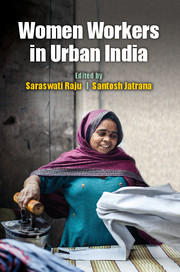Book contents
- Frontmatter
- Contents
- List of Figures
- List of Tables
- Preface
- 1 Setting the Backdrop
- 2 Women Workers in Urban India and the Cities
- 3 Gendered Vulnerabilities: Work-Life Trajectories of Female Domestic Workers in Jaipur
- 4 Occupational Domestication in a Post-Resettlement Context: An Analysis of Women's Work in Kannagi Nagar, Chennai
- 5 Old Jobs in New Forms: Women's Experiences in the Housekeeping Sector in Pune
- 6 Persistent Inequalities and Deepened Burden of Work? An Analysis of Women's Employment in Delhi
- 7 Spare Change for Spare Time? Homeworking Women in Banaras
- 8 Gender, Work and Space: Home-based Workers in Garment Industry in Kolkata
- 9 Labour Control and Responses: Women Workers in an Apparel Park in Kerala
- 10 New Urban Economic Spaces and the Gendered World of Work in Kolkata
- 11 Gender Equality and Women's Employment in the Banking Sector in India
- 12 Women Body Screeners and the Securitization of Space in Indian Cities
- Notes on Contributors
- Index
7 - Spare Change for Spare Time? Homeworking Women in Banaras
Published online by Cambridge University Press: 05 May 2016
- Frontmatter
- Contents
- List of Figures
- List of Tables
- Preface
- 1 Setting the Backdrop
- 2 Women Workers in Urban India and the Cities
- 3 Gendered Vulnerabilities: Work-Life Trajectories of Female Domestic Workers in Jaipur
- 4 Occupational Domestication in a Post-Resettlement Context: An Analysis of Women's Work in Kannagi Nagar, Chennai
- 5 Old Jobs in New Forms: Women's Experiences in the Housekeeping Sector in Pune
- 6 Persistent Inequalities and Deepened Burden of Work? An Analysis of Women's Employment in Delhi
- 7 Spare Change for Spare Time? Homeworking Women in Banaras
- 8 Gender, Work and Space: Home-based Workers in Garment Industry in Kolkata
- 9 Labour Control and Responses: Women Workers in an Apparel Park in Kerala
- 10 New Urban Economic Spaces and the Gendered World of Work in Kolkata
- 11 Gender Equality and Women's Employment in the Banking Sector in India
- 12 Women Body Screeners and the Securitization of Space in Indian Cities
- Notes on Contributors
- Index
Summary
Introduction
The overwhelming majority of women in the Indian informal sector are home-based workers. Eighty percent of homeworkers, that is home-based workers who work for piece-wages rather than on own-account, are women (Mehrotra and Biggeri 2007). Even after working for up to seven or eight hours a day homeworking women only earn around Rs 30, far below the minimum wage for unskilled workers (AIDWA 2010, Sengupta et al. 2007). Why are wages so low in home-based work? A recent study of homeworking women in Delhi found that most of the women interviewed did not consider themselves “workers” but rather “wives or mothers trying to make their little contribution to the family income” (AIDWA 2010). Despite women's long history of labour force participation in artisanal and other informal industry, and despite several academic and policy studies, women's work is not considered “real work,” but rather “spare-time work,” “help,” or “income-generating activity.” Thus in addition to well-known factors such as a captive labour force resulting from social restrictions, lower fallback options, and low labour productivity, one hypothesis that emerges from the literature on home-based work is that the undervaluation of women's work can be linked to different values placed on women's as opposed to men's time. Since homework is seen as being performed in the time left over after housework responsibilities such as cooking, cleaning, child-care and other care work, have been discharged, it is described, by contractors, husbands, as well as women, as being performed in “free time.” However, while references to this “spare-time discourse” are frequent, few studies have pursued the argument beyond anecdotes.
Drawing upon time-use surveys and interviews of women workers in the Banaras textile industry, I argue that women's time is undervalued in the market because it is seen as having a very low opportunity cost and their knowledge is undervalued because it is acquired informally and “free of cost.” The result is that even when women spend a full working day on skilled work, they are paid wages half that men receive for manual labour. The majority of women surveyed and interviewed in the present study are poor Muslims from the Ansari community and are subject to varying degrees of restrictions due to purdah. They are thus located at the intersection of class, caste, and gender hierarchies.
- Type
- Chapter
- Information
- Women Workers in Urban India , pp. 164 - 194Publisher: Cambridge University PressPrint publication year: 2016
- 1
- Cited by



